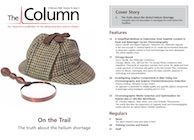Popular “Grass Roots” Event Goes Back to HPLC Basics
ChromSoc have announced the return of their popular “Grass Roots” event series, and a return to the subject of “Liquid Chromatography Fundamentals” following many requests for another iteration of the original 2016 course.
Photo Credit: Jez Campbell/stock.adobe.com

The Chromatographic Society (ChromSoc) have announced the return of their popular “Grass Roots” event series, and a return to the subject of “Liquid Chromatography Fundamentals” following many requests for another iteration of the original 2016 course. The event will be held in Ambleside at the University of Cumbria, UK.
The series was born out of the ChromSoc’s Diamond Anniversary celebrations back in 2016 and was aimed at graduate students and novice chromatographers from industry. Following the success of the initial course, held in Grasmere, in the Lake District, UK, the society has continued to hold the events, with each one focusing on a different topic, including small molecule method development and biopharmaceutical analysis.
The course will be a four-day event relevant to postgraduate students and novice industrial chromatographers, focusing on the fundamentals of liquid chromatography (LC) and how this can be applied practically in industry and academia. Lectures will include understanding the importance of molecular physicochemical parameters in chromatography, core approaches to manipulating chromatographic selectivity and resolution, chromatographic modes, understanding LC instrument operation (including hands-on activities with high performance liquid chromatography [HPLC] and ultrahighâpressure liquid chromatography [UHPLC] instruments), fundamental sample preparation approaches, and gradient chromatography.
The event will be delivered by a number of chromatographers with extensive training and industrial experience including Mel Euerby (Shimadzu), Tony Taylor (Crawford Scientific), Tony Edge (Agilent), and Paul Ferguson (AstraZeneca). While the meeting will be primarily educational, there will also be extensive opportunities for networking and a walk in the countryside of the Lake District, which is a World Heritage Site.
Funding from the ChromSoc, Shimadzu, YMC, and the Royal Society of Chemistry Separation Science Group has been made available to provide full funding for a limited number of UK-based postgraduate researchers (PhD/D.Phil) to attend. Additionally, ChromSoc are providing industrial bursaries for postdoctoral researchers, lecturers, and chromatographers working in small- and medium-sized companies.
Further information and the event registration link can be found on The Chromatographic Society’s website at https://chromsoc.com/event/grass-roots-2020/

Best of the Week: Food Analysis, Chemical Migration in Plastic Bottles, STEM Researcher of the Year
December 20th 2024Top articles published this week include the launch of our “From Lab to Table” content series, a Q&A interview about using liquid chromatography–high-resolution mass spectrometry (LC–HRMS) to assess chemical hazards in plastic bottles, and a piece recognizing Brett Paull for being named Tasmanian STEM Researcher of the Year.
Using LC-MS/MS to Measure Testosterone in Dried Blood Spots
December 19th 2024Testosterone measurements are typically performed using serum or plasma, but this presents several logistical challenges, especially for sample collection, storage, and transport. In a recently published article, Yehudah Gruenstein of the University of Miami explored key insights gained from dried blood spot assay validation for testosterone measurement.
Determination of Pharmaceuticals by Capillary HPLC-MS/MS (Dec 2024)
December 19th 2024This application note demonstrates the use of a compact portable capillary liquid chromatograph, the Axcend Focus LC, coupled to an Agilent Ultivo triple quadrupole mass spectrometer for quantitative analysis of pharmaceutical drugs in model aqueous samples.